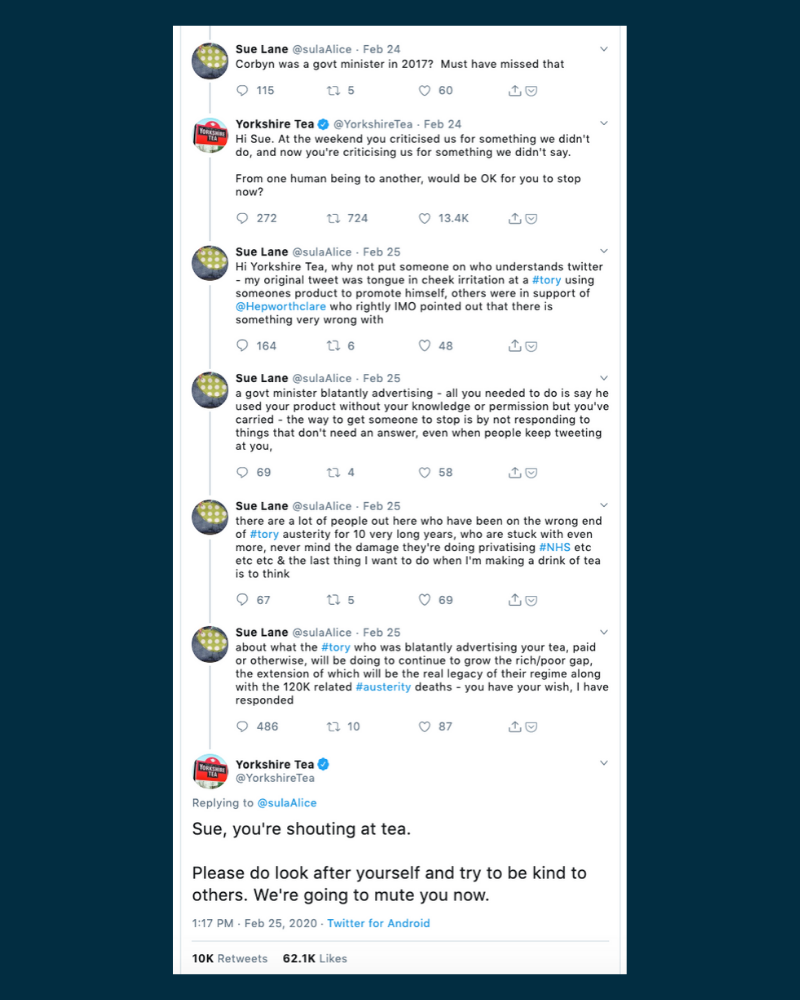How Yorkshire Tea accidentally whipped up the mob: the perils of deploying a razor sharp on social media
Who would want to be a social media manager for a brand? Sounds like a cushy job, manning Twitter and Facebook all day. But if the Yorkshire Tea Twitter storm has taught us one thing, it’s that it’s complicated.
For the uninitiated, it all flared up when the Chancellor of the Exchequer Rishi Sunak posted a tweet of him making a cup of tea for the office. Clearly one of those, “I’ll connect here and look like a man of the people” moments.
Of course, it backfired. It looked staged and part of an influencer marketing campaign.
Tons of people posting replies saying they would boycott Yorkshire Tea and making accusations towards the brand for selling out.
Yorkshire Tea’s initial response was brilliant, firmly pointing out that it wasn’t affiliated with the Chancellor and asking people to remember that there’s a person behind the brand. Other brands showed their solidarity.
It rumbles along for a bit, comms people dissecting the response on PR Week and the like.
Then it takes another turn when a Twitter user @SueLane takes her vitriol out on the brand and her dislike for the Tories and the effects of austerity.
This is where Yorkshire Tea made a mistake, in my view.
The retort was very witty. But that was the problem, it then became an excuse for everyone to wade in. It risks losing the moral high ground.
It all became a bit unsavoury, because Yorkshire Tea effectively set up a scenario for everyone to bully Sue. Talk of t-shirts and mugs being made. Amusing gifs and all that.
The reason for this is more than playground behaviour; what happens when a fight breaks out and all the kids chant “fight, fight”.
It’s about taking sides. Just like with Brexit, how everyone takes a side, with no intention of backing down. More than that, showing moral and intellectual superiority over the other side.
So Yorkshire Tea’s plea to “be kind”, just goes unnoticed.
I agree with Stephen Waddington’s assessment – the whole thing makes me feel uneasy too. Dan Slee offers good advice, “BBC Press Office has a good principle. Punch up but don't punch down. So they'll have bantz with a presenter if they're fine with it but not the public. This feels like punching down.”
Have a read of the thread on Stephen’s tweet. Not all comms professionals agree on this.
The other risk with all this is that Yorkshire Tea gets accused of doing this for its own notoriety. After all, everyone’s talking about the brand now. It starts to look like a marketing campaign. I don't think that was their intention starting out.
Defend the facts
I believe a brand has every right to correct an inaccuracy and defend itself over bullying tactics. Yes, it needs to do it in a way that’s human, but humour isn’t as risk-free as you might think.
And, like the fight in the playground, the brand needs to know when to walk away.



